译林牛津版八下Unit5 Good manners 单元测试卷(含答案)
文档属性
| 名称 | 译林牛津版八下Unit5 Good manners 单元测试卷(含答案) | 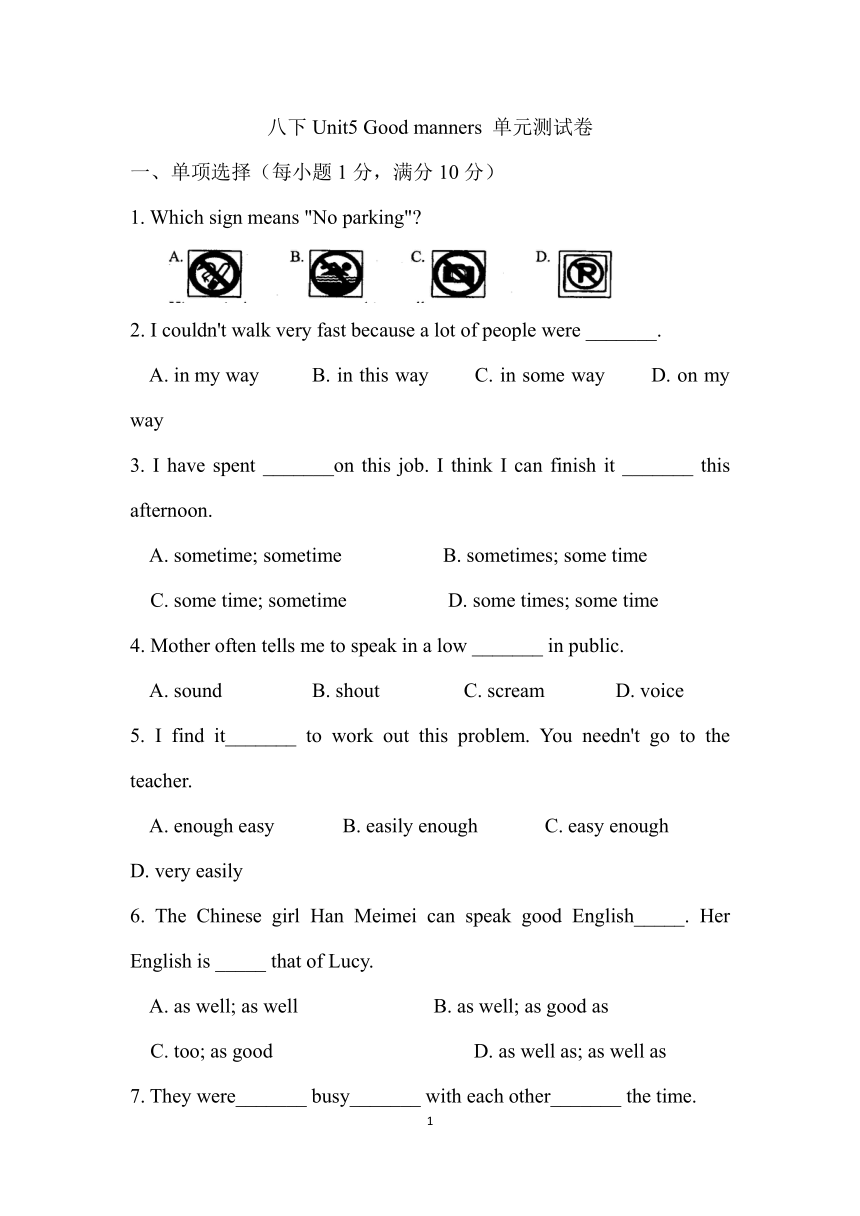 | |
| 格式 | docx | ||
| 文件大小 | 93.3KB | ||
| 资源类型 | 教案 | ||
| 版本资源 | 牛津译林版 | ||
| 科目 | 英语 | ||
| 更新时间 | 2021-03-26 15:30:41 | ||
图片预览

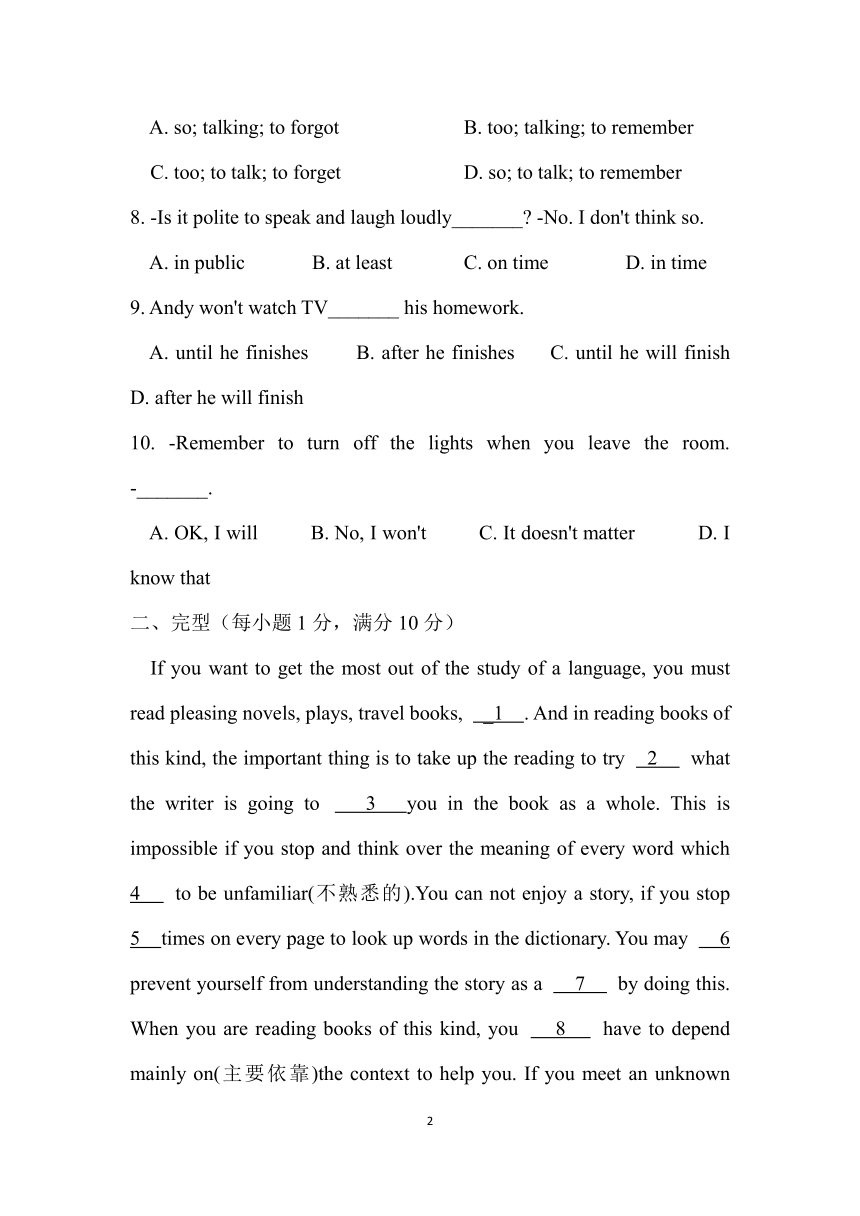
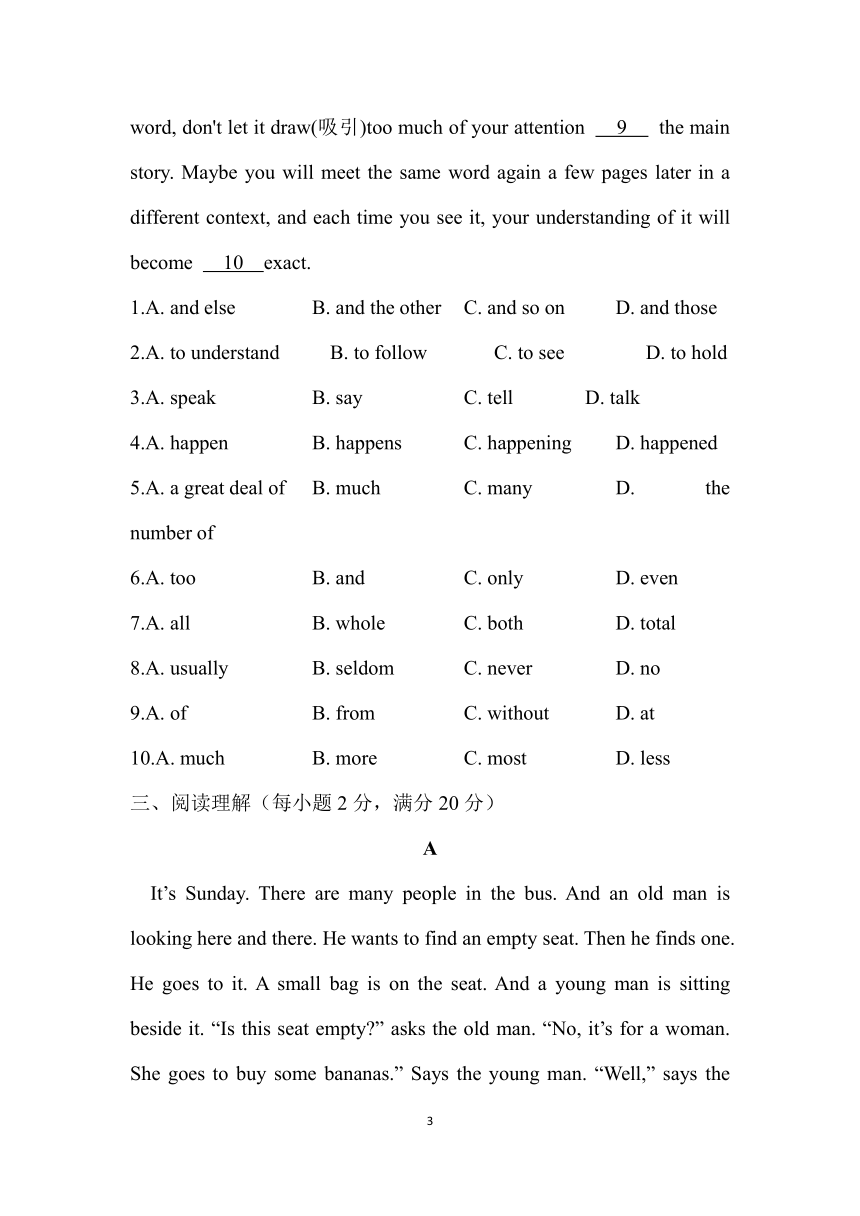
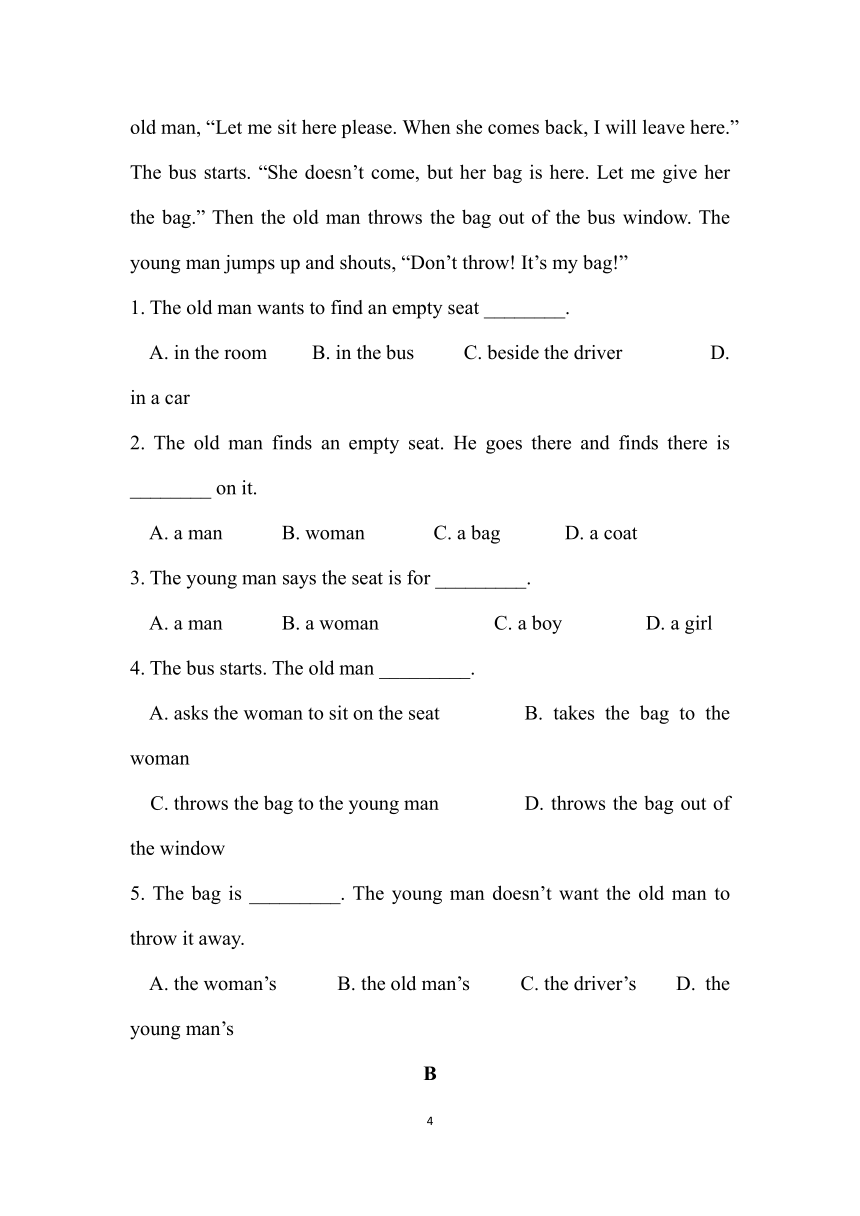
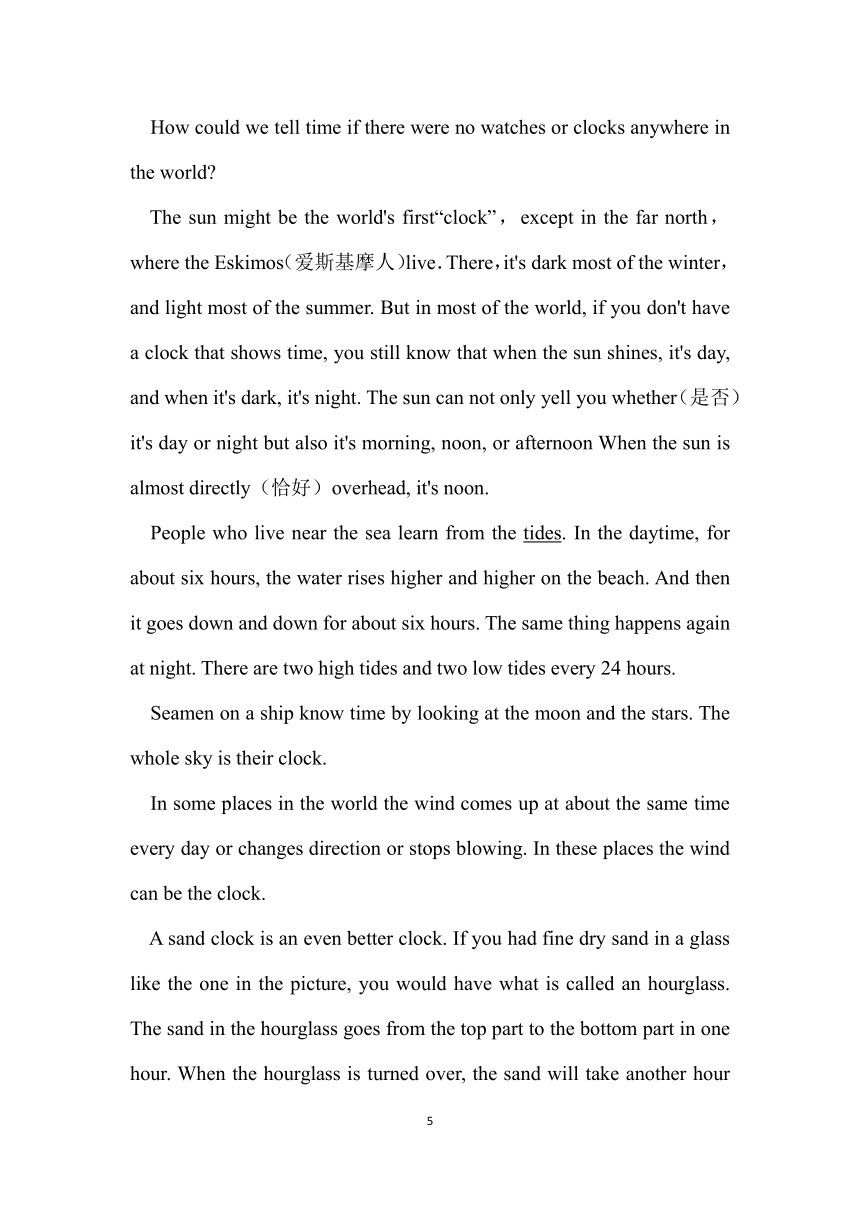
文档简介
八下Unit5 Good manners 单元测试卷
一、单项选择(每小题1分,满分10分)
1. Which sign means "No parking"?
2. I couldn't walk very fast because a lot of people were _______.
A. in my way B. in this way C. in some way D. on my way
3. I have spent _______on this job. I think I can finish it _______ this afternoon.
A. sometime; sometime B. sometimes; some time
C. some time; sometime D. some times; some time
4. Mother often tells me to speak in a low _______ in public.
A. sound B. shout C. scream D. voice
5. I find it_______ to work out this problem. You needn't go to the teacher.
A. enough easy B. easily enough C. easy enough D. very easily
6. The Chinese girl Han Meimei can speak good English_____. Her English is _____ that of Lucy.
A. as well; as well B. as well; as good as
C. too; as good D. as well as; as well as
7. They were_______ busy_______ with each other_______ the time.
A. so; talking; to forgot B. too; talking; to remember
C. too; to talk; to forget D. so; to talk; to remember
8. -Is it polite to speak and laugh loudly_______? -No. I don't think so.
A. in public B. at least C. on time D. in time
9. Andy won't watch TV_______ his homework.
A. until he finishes B. after he finishes C. until he will finish D. after he will finish
10. -Remember to turn off the lights when you leave the room. -_______.
A. OK, I will B. No, I won't C. It doesn't matter D. I know that
二、完型(每小题1分,满分10分)
If you want to get the most out of the study of a language, you must read pleasing novels, plays, travel books, _1 . And in reading books of this kind, the important thing is to take up the reading to try 2 what the writer is going to 3 you in the book as a whole. This is impossible if you stop and think over the meaning of every word which 4 to be unfamiliar(不熟悉的).You can not enjoy a story, if you stop 5 times on every page to look up words in the dictionary. You may 6 prevent yourself from understanding the story as a 7 by doing this. When you are reading books of this kind, you 8 have to depend mainly on(主要依靠)the context to help you. If you meet an unknown word, don't let it draw(吸引)too much of your attention 9 the main story. Maybe you will meet the same word again a few pages later in a different context, and each time you see it, your understanding of it will become 10 exact.
1.A. and else B. and the other C. and so on D. and those
2.A. to understand B. to follow C. to see D. to hold
3.A. speak B. say C. tell D. talk
4.A. happen B. happens C. happening D. happened
5.A. a great deal of B. much C. many D. the number of
6.A. too B. and C. only D. even
7.A. all B. whole C. both D. total
8.A. usually B. seldom C. never D. no
9.A. of B. from C. without D. at
10.A. much B. more C. most D. less
三、阅读理解(每小题2分,满分20分)
A
It’s Sunday. There are many people in the bus. And an old man is looking here and there. He wants to find an empty seat. Then he finds one. He goes to it. A small bag is on the seat. And a young man is sitting beside it. “Is this seat empty?” asks the old man. “No, it’s for a woman. She goes to buy some bananas.” Says the young man. “Well,” says the old man, “Let me sit here please. When she comes back, I will leave here.” The bus starts. “She doesn’t come, but her bag is here. Let me give her the bag.” Then the old man throws the bag out of the bus window. The young man jumps up and shouts, “Don’t throw! It’s my bag!”
1. The old man wants to find an empty seat ________.
A. in the room B. in the bus C. beside the driver D. in a car
2. The old man finds an empty seat. He goes there and finds there is ________ on it.
A. a man B. woman C. a bag D. a coat
3. The young man says the seat is for _________.
A. a man B. a woman C. a boy D. a girl
4. The bus starts. The old man _________.
A. asks the woman to sit on the seat B. takes the bag to the woman
C. throws the bag to the young man D. throws the bag out of the window
5. The bag is _________. The young man doesn’t want the old man to throw it away.
A. the woman’s B. the old man’s C. the driver’s D. the young man’s
B
How could we tell time if there were no watches or clocks anywhere in the world?
The sun might be the world's first“clock”,except in the far north,where the Eskimos(爱斯基摩人)live.There,it's dark most of the winter,and light most of the summer. But in most of the world, if you don't have a clock that shows time, you still know that when the sun shines, it's day, and when it's dark, it's night. The sun can not only yell you whether(是否)it's day or night but also it's morning, noon, or afternoon When the sun is almost directly(恰好)overhead, it's noon.
People who live near the sea learn from the tides. In the daytime, for about six hours, the water rises higher and higher on the beach. And then it goes down and down for about six hours. The same thing happens again at night. There are two high tides and two low tides every 24 hours.
Seamen on a ship know time by looking at the moon and the stars. The whole sky is their clock.
In some places in the world the wind comes up at about the same time every day or changes direction or stops blowing. In these places the wind can be the clock.
A sand clock is an even better clock. If you had fine dry sand in a glass like the one in the picture, you would have what is called an hourglass. The sand in the hourglass goes from the top part to the bottom part in one hour. When the hourglass is turned over, the sand will take another hour to go back again.
6. From the passage we can know there are_____ ways to tell time except the clock and watch.
A. 3 B. 4 C. 5 D. 7
7. The Eskimos in the far north can't use the sun for a clock because _______.
A. they know very little about the sun
B. the sun there never goes down in winter
C. it's too cold for them to go out to watch the sun
D. it has long day and long light during summers
8. The underlined word "tides" in the passage means_______.
A. 洋流 B. 潮汐 C. 海啸 D. 波浪
9. Which page of the newspaper may this passage be in?
A. News. B. Science. C. Advertisement. D. Sports.
10. What's the best title for the passage?
A. Different Ways to Tell Time B. How the Clock Was Invented
C. The Development of the Clock D. A Useful Machine to Tell Time
四、词汇检测(满分15分)
A) 根据下列句子及所给汉语注释或者根据句意,写出空缺处各单词的正确形式。每空只写一词。
1. Dropping_______ (垃圾) everywhere is not good for our environment.
2. We have to_______ (排队等候) up for an hour for he film tickets.
3. My mum always gives me a_______ (吻) goodbye every morning when I leave for school.
4. Climate change is still a popular_______ (话题) when people meet for the first time.
5. The government says it will let the_______ (民众) know what's going on in our country.
6.-It's impolite to make much_______ while eating. -I quite agree with you.
7. -Tom, if you do that, you will risk_______ everything you get.
-Thank you. I'll think it over again.
8. -How could you make your success as a writer?
-Well, I'm not clever but I believe the saying " _______ makes perfect".
B) 用括号中所给词的适当形式填空。
8. It is impolite_______ (speak) to the old people like that.
9. If you_______ (not be) careful next time, you will fail the exam once more.
11. No one knows what_______ (happen) to China in the future.
12. The dog_______ (lie) on the floor when the strange man broke into the house.
13. I can't take a walk with you. I'm too busy_______ (clean) the house now.
14. Amy, _______ (keep) your voice down in the library, please. Everyone is studying hard now.
7. So far, we_______ (raise) millions of dollars for the students in poor areas.
五、句子翻译(每小题3分,满分15分)
1. 在公共场合低声说话是好的。
__________________________________________________________
2. 刷牙时别让水龙头的水一直流。
__________________________________________________________
3. Peter太慢了,没能写下所有的重点。
__________________________________________________________
4. 该讲座的目的是为了教学生吃饭的规矩。
__________________________________________________________
5. 我们应该避免谈论年龄问题。
__________________________________________________________
六、阅读下面的短文,根据首字母提示,用合适的单词填空。(每空1分,满分10分)
Are you going to have dinner at your Western friend’s home? Then be (1) c_______ with your table manners. Good manners will make you a nice (2) g______.
You may find Western table manners are (3) d_______ from Chinese manners. Here is some good (4) a______ to keep you cool.
When you are (5) r_____ to eat, sit up straight on the chair. Usually, don’t put your elbows (胳膊肘) on the table. First (6) p______ your napkin (餐巾) up and put it on your lap. You can use it to clean your hands or mouth, but not your face. When you finish eating, put it (7) b_____ on the table.
Don’t make any noise when you eat or drink the soup. It’s not good to speak when your mouth is (8) f________. If you do that, people will see the food in your mouth.
If you want to get some food but you can’t (9) r________ it, ask others to pass the dish to you. Put bones on the edge of the plate. And remember, take bread with your (10) h_______, not with a fork.
七、书面表达(满分20分)
为配合我市开展“创建文明城市(build a civilized city)”活动,学校举办以"How to Behave Well”为主题的英语征文比赛。现在请你根据所给提示内容,用英语写一篇80词左右的小短文。
提示:1.衣着整洁;2.保持环境卫生;3.待人有礼,乐于助人;4.遵守交通规则; 5.……
How to Behave Well?
_______________________________________________________________________________
_______________________________________________________________________________
_______________________________________________________________________________
_______________________________________________________________________________
_______________________________________________________________________________
_______________________________________________________________________________
_______________________________________________________________________________
_______________________________________________________________________________
答案:
单选:1-5 DACDC 6-10 BBAAA
完型:1-5 CACBC 6-10 DBABB
阅读理解:1-5 BCBDD 6-10 CDBBA
词汇检测:A) litter; queue; kiss; subject; public; noise; losing; Practice;
B) to speak; aren’t; will happen; was lying; to clean; keep; have raised;
句子翻译:1. It's good to keep your voice down in public.
2. Don't leave the tap running while brushing your teeth.
3. Peter was too slow to write down all the main points.
4. The purpose of the talk is to teach students rules for eating.
5. We should avoid talking about age.
首字母:1. careful 2. guest 3. different 4. advice 5. ready
6. pick 7. back 8. full 9. reach 10. hand(s)
书面表达:
一、单项选择(每小题1分,满分10分)
1. Which sign means "No parking"?
2. I couldn't walk very fast because a lot of people were _______.
A. in my way B. in this way C. in some way D. on my way
3. I have spent _______on this job. I think I can finish it _______ this afternoon.
A. sometime; sometime B. sometimes; some time
C. some time; sometime D. some times; some time
4. Mother often tells me to speak in a low _______ in public.
A. sound B. shout C. scream D. voice
5. I find it_______ to work out this problem. You needn't go to the teacher.
A. enough easy B. easily enough C. easy enough D. very easily
6. The Chinese girl Han Meimei can speak good English_____. Her English is _____ that of Lucy.
A. as well; as well B. as well; as good as
C. too; as good D. as well as; as well as
7. They were_______ busy_______ with each other_______ the time.
A. so; talking; to forgot B. too; talking; to remember
C. too; to talk; to forget D. so; to talk; to remember
8. -Is it polite to speak and laugh loudly_______? -No. I don't think so.
A. in public B. at least C. on time D. in time
9. Andy won't watch TV_______ his homework.
A. until he finishes B. after he finishes C. until he will finish D. after he will finish
10. -Remember to turn off the lights when you leave the room. -_______.
A. OK, I will B. No, I won't C. It doesn't matter D. I know that
二、完型(每小题1分,满分10分)
If you want to get the most out of the study of a language, you must read pleasing novels, plays, travel books, _1 . And in reading books of this kind, the important thing is to take up the reading to try 2 what the writer is going to 3 you in the book as a whole. This is impossible if you stop and think over the meaning of every word which 4 to be unfamiliar(不熟悉的).You can not enjoy a story, if you stop 5 times on every page to look up words in the dictionary. You may 6 prevent yourself from understanding the story as a 7 by doing this. When you are reading books of this kind, you 8 have to depend mainly on(主要依靠)the context to help you. If you meet an unknown word, don't let it draw(吸引)too much of your attention 9 the main story. Maybe you will meet the same word again a few pages later in a different context, and each time you see it, your understanding of it will become 10 exact.
1.A. and else B. and the other C. and so on D. and those
2.A. to understand B. to follow C. to see D. to hold
3.A. speak B. say C. tell D. talk
4.A. happen B. happens C. happening D. happened
5.A. a great deal of B. much C. many D. the number of
6.A. too B. and C. only D. even
7.A. all B. whole C. both D. total
8.A. usually B. seldom C. never D. no
9.A. of B. from C. without D. at
10.A. much B. more C. most D. less
三、阅读理解(每小题2分,满分20分)
A
It’s Sunday. There are many people in the bus. And an old man is looking here and there. He wants to find an empty seat. Then he finds one. He goes to it. A small bag is on the seat. And a young man is sitting beside it. “Is this seat empty?” asks the old man. “No, it’s for a woman. She goes to buy some bananas.” Says the young man. “Well,” says the old man, “Let me sit here please. When she comes back, I will leave here.” The bus starts. “She doesn’t come, but her bag is here. Let me give her the bag.” Then the old man throws the bag out of the bus window. The young man jumps up and shouts, “Don’t throw! It’s my bag!”
1. The old man wants to find an empty seat ________.
A. in the room B. in the bus C. beside the driver D. in a car
2. The old man finds an empty seat. He goes there and finds there is ________ on it.
A. a man B. woman C. a bag D. a coat
3. The young man says the seat is for _________.
A. a man B. a woman C. a boy D. a girl
4. The bus starts. The old man _________.
A. asks the woman to sit on the seat B. takes the bag to the woman
C. throws the bag to the young man D. throws the bag out of the window
5. The bag is _________. The young man doesn’t want the old man to throw it away.
A. the woman’s B. the old man’s C. the driver’s D. the young man’s
B
How could we tell time if there were no watches or clocks anywhere in the world?
The sun might be the world's first“clock”,except in the far north,where the Eskimos(爱斯基摩人)live.There,it's dark most of the winter,and light most of the summer. But in most of the world, if you don't have a clock that shows time, you still know that when the sun shines, it's day, and when it's dark, it's night. The sun can not only yell you whether(是否)it's day or night but also it's morning, noon, or afternoon When the sun is almost directly(恰好)overhead, it's noon.
People who live near the sea learn from the tides. In the daytime, for about six hours, the water rises higher and higher on the beach. And then it goes down and down for about six hours. The same thing happens again at night. There are two high tides and two low tides every 24 hours.
Seamen on a ship know time by looking at the moon and the stars. The whole sky is their clock.
In some places in the world the wind comes up at about the same time every day or changes direction or stops blowing. In these places the wind can be the clock.
A sand clock is an even better clock. If you had fine dry sand in a glass like the one in the picture, you would have what is called an hourglass. The sand in the hourglass goes from the top part to the bottom part in one hour. When the hourglass is turned over, the sand will take another hour to go back again.
6. From the passage we can know there are_____ ways to tell time except the clock and watch.
A. 3 B. 4 C. 5 D. 7
7. The Eskimos in the far north can't use the sun for a clock because _______.
A. they know very little about the sun
B. the sun there never goes down in winter
C. it's too cold for them to go out to watch the sun
D. it has long day and long light during summers
8. The underlined word "tides" in the passage means_______.
A. 洋流 B. 潮汐 C. 海啸 D. 波浪
9. Which page of the newspaper may this passage be in?
A. News. B. Science. C. Advertisement. D. Sports.
10. What's the best title for the passage?
A. Different Ways to Tell Time B. How the Clock Was Invented
C. The Development of the Clock D. A Useful Machine to Tell Time
四、词汇检测(满分15分)
A) 根据下列句子及所给汉语注释或者根据句意,写出空缺处各单词的正确形式。每空只写一词。
1. Dropping_______ (垃圾) everywhere is not good for our environment.
2. We have to_______ (排队等候) up for an hour for he film tickets.
3. My mum always gives me a_______ (吻) goodbye every morning when I leave for school.
4. Climate change is still a popular_______ (话题) when people meet for the first time.
5. The government says it will let the_______ (民众) know what's going on in our country.
6.-It's impolite to make much_______ while eating. -I quite agree with you.
7. -Tom, if you do that, you will risk_______ everything you get.
-Thank you. I'll think it over again.
8. -How could you make your success as a writer?
-Well, I'm not clever but I believe the saying " _______ makes perfect".
B) 用括号中所给词的适当形式填空。
8. It is impolite_______ (speak) to the old people like that.
9. If you_______ (not be) careful next time, you will fail the exam once more.
11. No one knows what_______ (happen) to China in the future.
12. The dog_______ (lie) on the floor when the strange man broke into the house.
13. I can't take a walk with you. I'm too busy_______ (clean) the house now.
14. Amy, _______ (keep) your voice down in the library, please. Everyone is studying hard now.
7. So far, we_______ (raise) millions of dollars for the students in poor areas.
五、句子翻译(每小题3分,满分15分)
1. 在公共场合低声说话是好的。
__________________________________________________________
2. 刷牙时别让水龙头的水一直流。
__________________________________________________________
3. Peter太慢了,没能写下所有的重点。
__________________________________________________________
4. 该讲座的目的是为了教学生吃饭的规矩。
__________________________________________________________
5. 我们应该避免谈论年龄问题。
__________________________________________________________
六、阅读下面的短文,根据首字母提示,用合适的单词填空。(每空1分,满分10分)
Are you going to have dinner at your Western friend’s home? Then be (1) c_______ with your table manners. Good manners will make you a nice (2) g______.
You may find Western table manners are (3) d_______ from Chinese manners. Here is some good (4) a______ to keep you cool.
When you are (5) r_____ to eat, sit up straight on the chair. Usually, don’t put your elbows (胳膊肘) on the table. First (6) p______ your napkin (餐巾) up and put it on your lap. You can use it to clean your hands or mouth, but not your face. When you finish eating, put it (7) b_____ on the table.
Don’t make any noise when you eat or drink the soup. It’s not good to speak when your mouth is (8) f________. If you do that, people will see the food in your mouth.
If you want to get some food but you can’t (9) r________ it, ask others to pass the dish to you. Put bones on the edge of the plate. And remember, take bread with your (10) h_______, not with a fork.
七、书面表达(满分20分)
为配合我市开展“创建文明城市(build a civilized city)”活动,学校举办以"How to Behave Well”为主题的英语征文比赛。现在请你根据所给提示内容,用英语写一篇80词左右的小短文。
提示:1.衣着整洁;2.保持环境卫生;3.待人有礼,乐于助人;4.遵守交通规则; 5.……
How to Behave Well?
_______________________________________________________________________________
_______________________________________________________________________________
_______________________________________________________________________________
_______________________________________________________________________________
_______________________________________________________________________________
_______________________________________________________________________________
_______________________________________________________________________________
_______________________________________________________________________________
答案:
单选:1-5 DACDC 6-10 BBAAA
完型:1-5 CACBC 6-10 DBABB
阅读理解:1-5 BCBDD 6-10 CDBBA
词汇检测:A) litter; queue; kiss; subject; public; noise; losing; Practice;
B) to speak; aren’t; will happen; was lying; to clean; keep; have raised;
句子翻译:1. It's good to keep your voice down in public.
2. Don't leave the tap running while brushing your teeth.
3. Peter was too slow to write down all the main points.
4. The purpose of the talk is to teach students rules for eating.
5. We should avoid talking about age.
首字母:1. careful 2. guest 3. different 4. advice 5. ready
6. pick 7. back 8. full 9. reach 10. hand(s)
书面表达:
